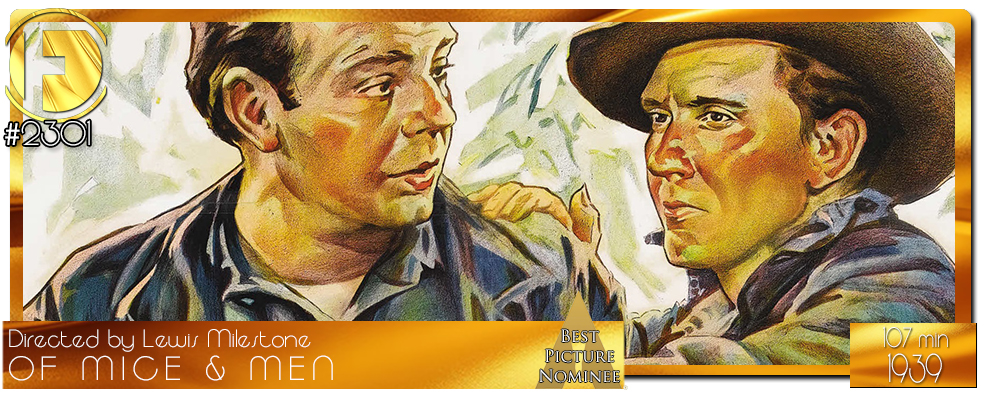Movie Review – Of Mice And Men (1939)
Principal Cast : Burgess Meredith, Betty Field, Lon Chaney Jr, Charles Bickford, Noah Beery Jr, Roman Bohnen, Bob Steele, Oscar O’Shea, Granville Bates, Helen Lynd.
Synopsis: A mentally disabled giant and his level headed guardian find work at a sadistic cowboy’s ranch in depression era America.
********
One of the great American novels, John Steinbeck’s Depression-era fable of two itinerant workers slogging through California’s Great Dustbowl to shape their own property dreams has been a staple in English literature classrooms across the world for as long as I can remember – it was a staple during my early high school years (we had to read it in between “Macbeth” in Year 9 and “Macbeth” in Year 11 – don’t ask, long story) and I remember being particularly moved by Steinbeck’s portrayal of the taller, stronger character of Lennie, a dull-witted man with the intellect of a five year old. A sidebar; in the same year I was first exposed to Daniel Keyes’ incredible short story “Flowers for Algernon”, and with the undercurrent themes of mental disability in both texts they were quite a profound experience in my youth. Lewis Milestone’s adaptation of Steinbeck’s stage version of his own novel is a remarkably powerful piece of dramatic fiction, and its hard not to see why it was nominated for Best Picture in 1939, alongside other Hollywood icons such as The Wizard of Oz, Gone With The Wind (the winner of said award) and Mr Smith Goes To Washington, among others.
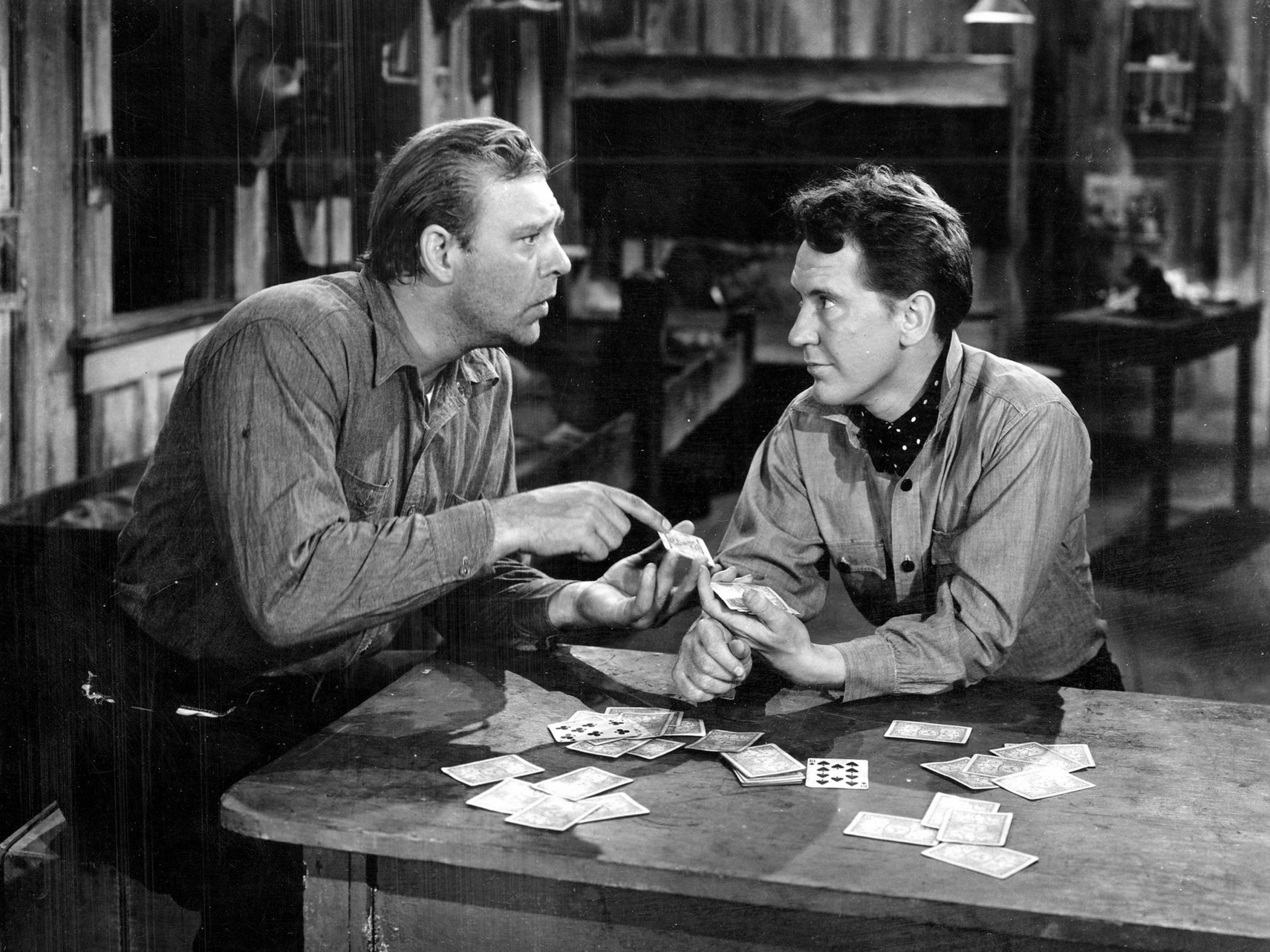
The emotional heft of the film is superbly manifested by the two central performances of stars Burgess Meredith (better known to Gen-Xers as Penguin from the Adam West Batman serial) and Lon Chaney Jr, son of legendary horror film star Lon Chaney. Meredith and Chaney Jr play George and Lennie respectively, two itinerant farm workers traipsing through the Great Depression seeking to earn enough to purchase their own piece of property and, as Lennie says “live off the fat of the land!”. George is the dreamer and brains of the pair, whilst Lennie is mentally challenged, with the intellectual capacity of a young child. George cares for Lennie primarily because they are cousins, but largely out of a sense of empathy George has for the stronger, taller giant. They arrive at a small ranch and are introduced to the boss, Jackson (Oscar O’Shea) and his cruel, violent son Curley (Bob Steele), and spend time working alongside fellow farmhands Slim (Charles Bickford), Candy (Roman Bohnen) and Whit (Noah Beery), all while trying to interact with Curley’s young wife Mae (Betty Field), lest they set Curley off with a temper.
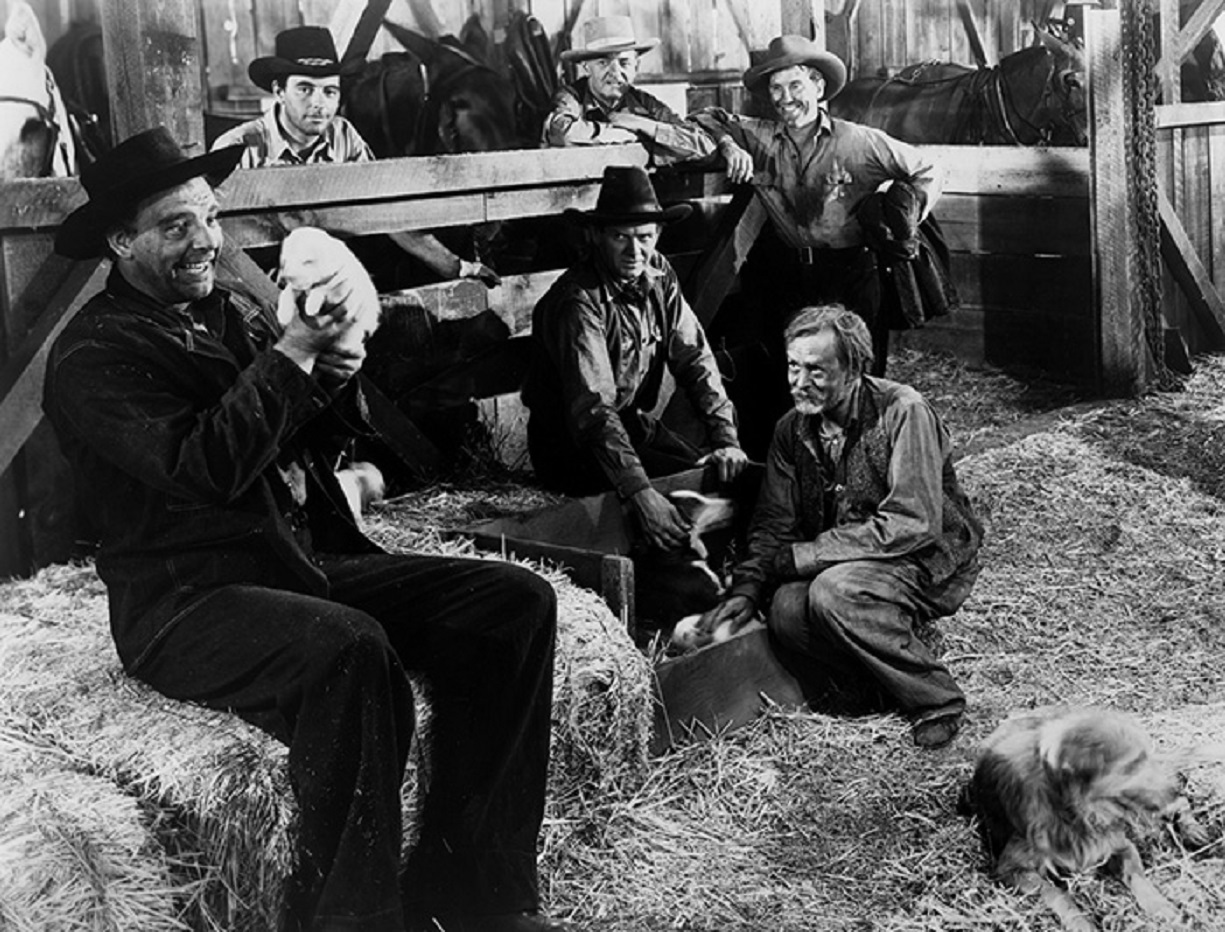
While my memories of the original novel version of Of Mice And Men is hazy, as I was watching the film version something in my brain unlocked a long-dormant dream I had as a kid reading the book, the kind of mind’s eye version you have in your imagination about what things looked like, smelt like, sounded like, back during the Great Depression. Like many of you reading this, I’m several generations removed from the Depression and have no real context for how awful living through this period must have been, with employment and food uncertainty lurking behind every minor injury or missed workday. Of Mice And Men catapulted me back into my classroom youth, reliving Steinbeck’s terrific prose and ability to pull the reader (or viewer, as it were) into that world, and Milestone depicts it beautifully. Or terribly, depending on your outlook. Little wonder – at the time Of Mice And Men was released, the Depression was still ongoing, and (according to many experts on the subject) would only come to a halt with the Japanese bombing of Pearl Harbor and the US entry into World War II in 1942. So it’s prescient that a book written at the height of the Depression, in 1937, and a film version released only two short years later, that would so accurately depict American life at that time, still ring true even in today’s modern world, and how insecure our lives are at the whims of others.

Milestone’s film captures the characters of the book in all their beauty, tragedy and humanity. Very few films of this period have made me legitimately emotional by the end, but Milestone’s adaptation definitely did. A resounding triumph of writing, acting and production design, Of Mice And Men may be approaching its centenary but it has truly lost none of its bitterness, nor its hope. The film’s central performance is Burgess Meredith’s George, a fast-talking yet honourable man caring for his intellectually disabled cousin, and Meredith really shares a genuine on-screen rapport with the larger Chaney Jr, so much so that you never once seem to think they’re just actors playing a role. Both Meredith and Chaney Jr inhabit their respective roles with consummate ease, and I was surprised to learn that neither Meredith, nor the film’s other standout performer in Roman Bohnen, were up for an Oscar for their work. They deliver Eugene Solow’s screenplay adaptation with perfection, a rapid-fire delivery in keeping with filmmaking styles of the time, although there’s a raw humanity behind every phrase and utterance that strikes the viewer immediately. While Burgess Meredith carries the lion’s share of dialogue, Lon Chaney Jr’s performance as Lennie is acutely restrained enough that we don’t think of the character as an absolute imbecile, but rather a lost child looking for a parent. That’s the thing I got from the book, and that’s the exact timbre Milestone achieves here: Lennie is a child in a powerful adult’s body and he deserves our sympathy and understanding (and gets it), rather than condemnation. For a film of this vintage to cover such deeply held emotional convictions with such nuance, I’m gobsmacked.
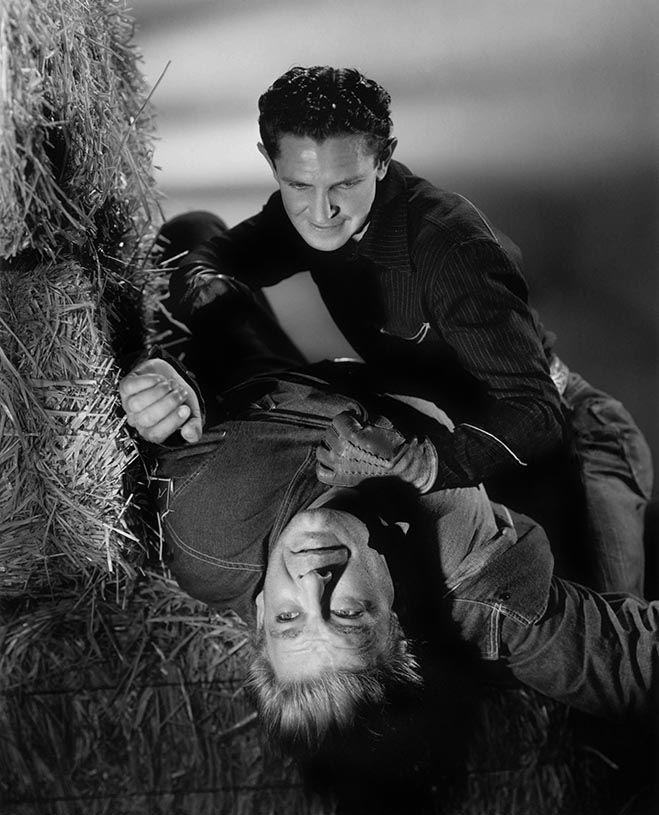
Chaney Jr and Meredith aside, the rest of the cast all do solid work as part of the wider ensemble. Bob Steele makes a odious Curley a legitimate point of tension within the film’s framework, a firecracker waiting for a miniscule fuse to be lit before exploding in a rage, and the actor turns a possibly one-dimensional role into a two dimensional screen villain. Noah Beery Jr, Granville Bates and Leigh Whipper play various denizens of the Californian ranch George and Lennie arrive at, and their repartee throughout the film is one of genuine friendship, withering hatred of their situation, and general dismissiveness of personal circumstance. Whipper, as the farm’s black labourer Crooks, is a particularly good actor in a relatively minor role, but his emotional decrying of people “invading what little space he has” on the ranch absolutely broke my heart. Arguably the film’s MVP for me, though, is Roman Bohnen as Candy, the ageing farmhand with few prospects but a sliver of hope in a similar dream to that of George and Lennie; owning his own piece of land. Candy is the really devastating character in the film (I can’t remember him from the book, it’s been so long, but I have to assume the role is similar on the printed page) as he traverses the emotional punches of having his dog put down, and dreams dashed at almost every step, and if a single character could be the beating heart of American devastation in the story, it is he. Bohnen delivers a startlingly emotional turn that I found quite affecting, the reaction to his dog being shot out back nearly brought me to tears – I suspect that was the intention of the filmmakers.
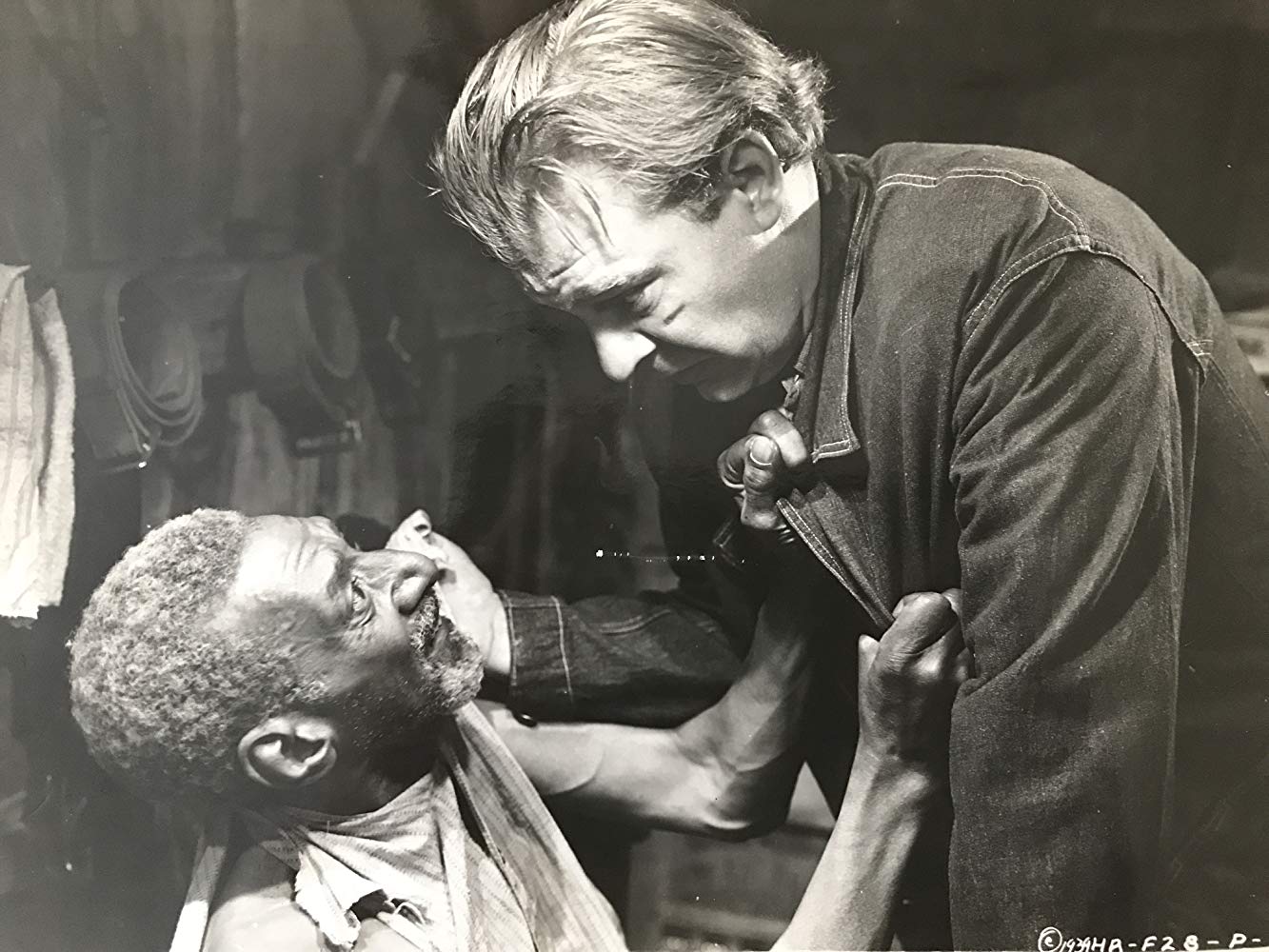
If there’s a weak point to the film, it’s probably the performance of Betty Field as the tragic Mae. Nothing against the actress, I’m sure she was directed well enough by Milestone on-set, but I struggled to find her an empathetic character at all, and her fate by film’s end was more of a “well, you probably didn’t deserve it, but *shrug*” and that’s not good for the inciting incident to resound with the viewer. It was either the writing of her, or Milestone’s direction of her, that felt undercooked: Mae comes off as a spoilt, ungrateful brat while simultaneously being a victim of atrocious domestic violence and emotional abuse, and the actress can’t quite nail the nuance of the part. We want Mae to escape the brutal marriage she has to Curley, we want to see her go live a wonderful life with a wonderful man somewhere, but as with many people caught in the Depression, financial ruin is but a heartbeat away and many weren’t prepared to take that big a risk. Mae’s devastating fate works mostly because the rest of the cast pick up some of the slack, not because Field delivers a performance to satisfy the dramatic demands of the narrative. Although I’ve devoted a paragraph to this point, it is but a small one in the grand scheme of this movie, but make of it what you will.
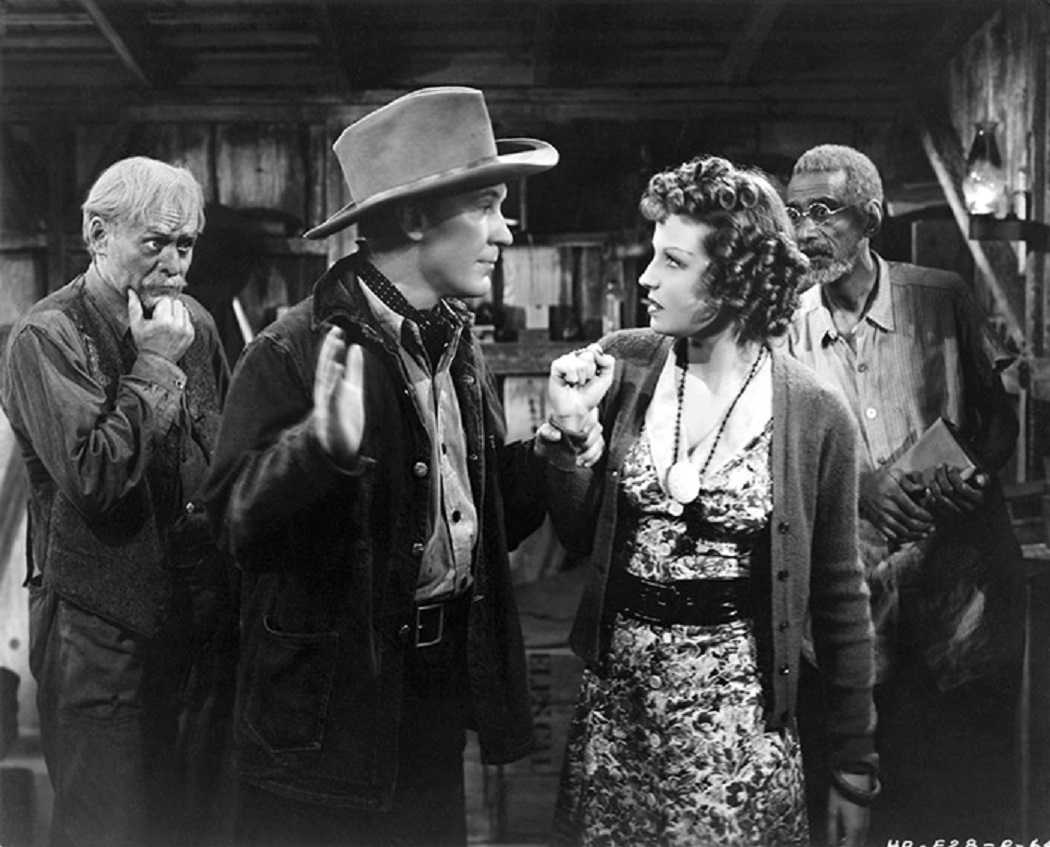
In terms of production, Of Mice And Men’s photography and design work are all perfectly captured by Norbert Brodine’s elegant, simple cinematography. Everything about the film works, from the bright sunlit fields of the ranch to the dreary interiors of the workers quarters and beyond, and while you can’t say the film has any particular technical accomplishment it’s the lack of ostentation that focuses on the characters and the dialogue that makes the film positively sing. It’s a film very much similar in tone to Robert Mulligan’s To Kill A Mockingbird, that homey, down-farm Americana flavour permeating every frame that almost makes you yearn for the glory days of the Great Depression. Life was both simpler and inordinately harder back in the 1930’s, and nostalgic rumination for these halcyon days feels weirdly absurd through today’s lens. Still, even considering some of the dated film techniques of the period, Of Mice And Men features a couple of extraordinary directorial flourishes; notably, a huge pull back camera move as George leaves to track down an on-the-run Lennie before he’s lynched by a raving mob, Burgess Meredith leaving the barn with Slim watching on knowingly, resigned to the awful fate of the cousins to come. It’s a terrific moment in the movie, coming at a time of incredibly high emotion, and flat-out shocked me to my core. It isn’t always like this – lengthy conversational sequences are shot and edited far more traditionally, but there are moments of tragic beauty in what Lewis Milestone accomplishes behind the camera here that augment an already charged narrative.
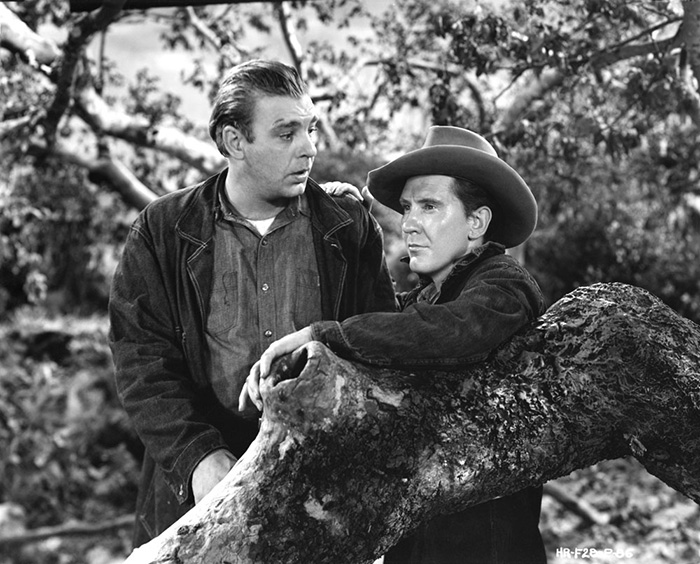
Of Mice And Men might not be culturally relevant to today’s high-octane society but as a story of humanity, desperation and dreams, I would argue it remains as pertinent to many aspirational types as ever. I do wonder what nostalgic gloss my childhood experiences with the book might have placed over my viewing of the film for the first time (I can’t believe it’s taken so long!) but from a critical perspective the film is literally a perfect movie, and those come along oh so rarely. Burgess Meredith is an actor I associate so closely to the Penguin caricature he played in my television youth I figured I’d struggle to get past that, though it was but a fleeting pause before I accepted him as the garrulous George. A staggering adaptation of book-to-stage-to-screen, Of Mice And Men is a towering film achievement and essential viewing for those who seek a deeper connection in their film viewing experiences.

